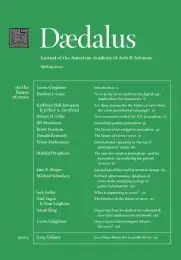Does science fiction suggest futures for news?
If at first an idea does not sound absurd, then there is no hope for it.
–Albert Einstein
I long dismissed science fiction as fairytale foolishness banged out by hacks for barely literate adolescents. Such fiction was aimed at pimply teenage boys who purchased or purloined their sci-fi paperbacks from the bus-station racks next to displays of romance novels and the hardcore men’s magazines in brown wrappers.
My doubts about speculative fiction echoed the reservations of philosophers, poets, and scholars, ancient and contemporary. Aristotle warned that no one can narrate what has yet to happen. John Donne dismissed as perverse those who undertake “to write a chronicle of things before they are done.”1
A more contemporary commentator, the English literature professor Tom Shippey, described the revulsion by otherwise open-minded, sophisticated academic colleagues toward science fiction: “They ‘never read science fiction, just can’t read science fiction, don’t see how anyone gets anything out of science fiction.’”2
The presence in science fiction of many bits of hard-to-digest information that Shippey calls “not-true, but also . . . not-unlike-true, not-flatly- (and in the current state of knowledge) impossible” annoys those academic readers.3 They are troubled by technological gimmicks and fanciful otherworldliness. They are perplexed by intentionally confusing narrative and references to an unfamiliar, futuristic device, concept, or circumstance that the author has not fully explained.
They also may be bothered, I suspect, by science fiction’s subversiveness–its attack on reality and fact. Science fiction suggests illogical, counterfactual possibilities. A future based on those possibilities may threaten logical people who have thought of the future as something that can be rationally determined.
But, as I will try to make clear, science fiction, like a giant July 4th fireworks pinwheel, throws off flashes of potential futures for news that readers are not likely to encounter by reading the predictions and prefigurements of scientists and other scholars. However rational, however commonsensical, the scientists and scholars may fail precisely because they are rational and commonsensical. The writers of speculative fiction choose instead to explore ideas that, while not demon- . . .
